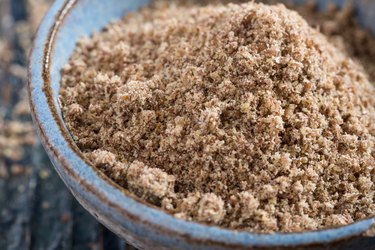
Metamucil is a fiber supplement for digestive health that is available in different forms, like powders, capsules and fiber thins, some with added sugar and flavors. Here's what you need to know about the different types of Metamucil and their nutritional information.
Read more: Can You Take Metamucil Everyday?
Video of the Day
Video of the Day
Metamucil’s Benefits From Psyllium Husk
According to the Cleveland Clinic, your doctor may prescribe fiber supplements like Metamucil to relieve both constipation and diarrhea if your diet doesn't provide enough fiber. Psyllium husk is the primary ingredient in Metamucil as well as other fiber supplements, notes Harvard Health Publishing. Psyllium is a plant-based source of fiber that is obtained from the seeds of the Plantago ovata herb.
In fact, Metamucil's benefits extend beyond digestive health. Harvard Health Publishing notes that psyllium husk not only relieves constipation but also lowers your cholesterol levels and improves heart health. Per Harvard Health Publishing, psyllium is a bulk-forming laxative that combines with liquid to form a thick gel that absorbs bile acids as well as cholesterol, which are then eliminated from your body via your stool.
The Cleveland Clinic explains that fiber also regulates your blood sugar levels, enables weight management by promoting satiety and can help prevent intestinal cancer by preventing the buildup of harmful substances in your digestive tract.
Despite Metamucil's many benefits, you should take it only as instructed by your doctor. The Cleveland Clinic notes that excess fiber could interfere with the absorption and effectiveness of certain medicines and nutrients. The U.S. National Library of Medicine states that psyllium supplements are to be taken one to three times a day, per your doctor's instructions, and that you should not take them for longer than a week unless prescribed by your doctor.
Read more: Can You Eat Too Much Metamucil?
Metamucil Nutritional Information
Metamucil's nutrition facts for each of its products are listed on its website. While all the products are made with psyllium husk, the nutrition profile of each product varies slightly depending on its other ingredients. For instance, the real sugar varieties of Metamucil have more calories and a higher carbohydrate content than the sugar-free varieties.
The Orange Smooth Powder with Real Sugar variety of Metamucil has 90 calories and 23 grams of carbs per serving, of which 16 grams are from sugar and the rest are from dietary fiber. In comparison, the Premium Blend Orange Sugar-Free Powder variety of Metamucil has only 30 calories and 10 grams of carbs per serving, and the carbs are all fiber with no sugar.
The sugar-free varieties of Metamucil use various sweeteners. For example, the Sugar-Free Berry Smooth Powder is sweetened with aspartame, an artificial sweetener, whereas the Premium Blend Orange Sugar-Free Powder is sweetened with stevia, a natural zero-calorie sweetener.
Read more: Will Metamucil Help Me Lose Weight?
Metamucil's calories are from carbohydrates, because the powder and capsule varieties do not contain any protein or fat. They do contain small amounts of minerals like potassium, iron and sodium. The flavored varieties of Metamucil contain natural and artificial colors and flavors that include citric acid, malic acid, paprika and turmeric.
The Fiber Thins range of Metamucil products are fiber-rich cookies, where each serving contains 20 percent of your daily fiber requirement. These cookies are made with ingredients like grains, oil and sugar, among others, so they also contain some fat and small amounts of protein.
- Cleveland Clinic: “Improving Your Health With Fiber”
- Harvard Health Publishing: “Psyllium Fiber: Regularity and Healthier Lipid Levels?”
- U.S. National Library of Medicine: “Psyllium”
- Metamucil: “Our Products”
- Metamucil: “Metamucil Orange Smooth Powder with Real Sugar”
- Metamucil: “Premium Blend Orange Sugar-Free Powder”
- Metamucil: “Sugar-Free Berry Smooth Powder”
- Metamucil: “Fiber Thins”